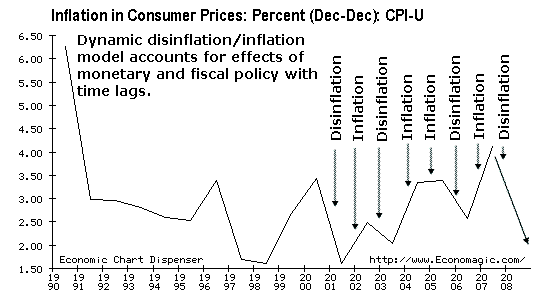Re: Deflationistas, inflationistas, and hyperinflationistas - Eric Janszen
Okay, let's try it this way. Here is Mish vs iTulip in charts.

iTulip Ka-Poom Theory of cycles of asset price inflation, disinflation, and reflation.
The last line with the arrow is the disinflation forecast.
The rest of the chart is right out of economagic. How's that for a disinflation forecast?

Mish's "Deflation All The Time Theory" sees deflation even when inflation is rampant
What if we did it the other way? What if we said, "Inflation, inflation, inflation, inflation, inflation, inflation..." through periods of both inflation and disinflation? Then we'd be "wrong" when the disinflation part of the cycle and "right" when inflation occurred.
Originally posted by raja
View Post

iTulip Ka-Poom Theory of cycles of asset price inflation, disinflation, and reflation.
The last line with the arrow is the disinflation forecast.
The rest of the chart is right out of economagic. How's that for a disinflation forecast?

Mish's "Deflation All The Time Theory" sees deflation even when inflation is rampant
What if we did it the other way? What if we said, "Inflation, inflation, inflation, inflation, inflation, inflation..." through periods of both inflation and disinflation? Then we'd be "wrong" when the disinflation part of the cycle and "right" when inflation occurred.

Comment